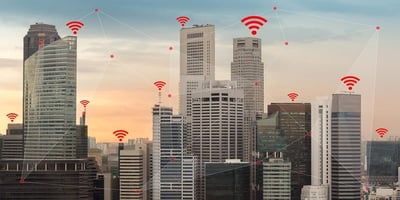How to Achieve Decarbonization Through HVAC Automation

It would be difficult to argue against the fact that we're in the midst of an environmental crisis. The debate over climate change has long been over - what's required now is a call to action. Businesses worldwide seem to understand that as they focus on new technologies to reach carbon neutrality. This is especially true when it comes to cooling and heating around the world.
HVAC systems are responsible for 25% of energy usage in buildings and in homes, so the first step would be to optimize their performance to reduce energy costs and promote sustainability is going to be critical.
While newer and more energy-efficient air conditioners and heaters have come to the market in recent years, there are ways to optimize existing HVAC systems without the need for full retrofits, to make them more efficient and lead to a reduction in carbon footprint.
We'll focus on three ways to achieve the above:
- Using AC Controllers
- Using IoT sensors
- HVAC Automation using AI
Let's look at each point in a bit more detail.
AC Controllers
AC controllers are devices that integrate into your existing HVAC system and regulate the functioning of HVAC systems according to defined parameters to ensure their optimal performance.
One of the main ways AC controllers improve HVAC efficiency is by providing precise temperature and humidity control within a given environment. They can be programmed to maintain a set temperature and humidity range, which can help to prevent overcooling or overheating.
By controlling the temperature and humidity levels, AC controllers can ensure that the HVAC system only operates when necessary, which can help reduce the load on the HVAC system. This, in turn, leads to significant energy savings, reducing both waste and costs.
AC controllers can also optimize airflow, which can further reduce energy consumption. By adjusting the settings of the HVAC system, AC controllers can distribute air evenly throughout a building or home, reducing the need for additional heating or cooling.
IoT Sensors
IoT sensors are one of the most effective ways to optimize energy with HVAC systems. IoT sensors can continually monitor and adjust HVAC performance based on things like occupancy rates, outdoor temperature, and humidity levels. With this approach, HVAC systems operate only when necessary, reducing energy use, carbon emissions, and costs.
You'll also want to make sure your HVAC systems undergo regular maintenance and IoT sensors can monitor your HVAC system’s health and proactively alert you when it could use maintenance. Proper maintenance ensures that HVAC systems operate efficiently, again reducing energy consumption and costs. Regular maintenance also helps prevent breakdowns and extends your equipment's lifespan while improving its efficiency.
AI-driven HVAC Systems
Building upon the two above points is artificial intelligence - the gold standard in HVAC optimization.
Artificial intelligence has a mind-blowing capacity to analyze massive amounts of data to produce actionable outputs. And that's precisely what they do in the context of HVAC optimization.
AI-powered HVAC systems, like Sensibo powered units, can optimize energy consumption by analyzing data on temperature, humidity, occupancy, and other factors. By using machine learning algorithms, AI-driven systems can learn from historical data and adjust HVAC settings to meet the building's or home’s needs while minimizing energy consumption. This gives you significant energy savings (and a reduced carbon footprint).
AI-powered HVAC systems can:
- Predict occupancy patterns and adjust the HVAC system's settings accordingly, ensuring that energy is used only where and when needed.
- Optimize maintenance schedules by analyzing data on the HVAC system's performance, preventing breakdowns, and ensuring that the HVAC system is operating efficiently.
- Integrate with existing building automation systems and adjust HVAC settings based on real-time data.
That last point is key. Artificial intelligence thrives on data - meaning, the more data it can analyze, the better its performance will be. Providing it with access to your existing systems (IoT sensors, AC controllers) will enable the AI model to produce more precise outputs and grow your energy optimization gains.
Wrapping Up
We're not going to achieve carbon neutrality overnight. There's a suite of factors that businesses must take into account when considering a reduction in their carbon footprint. However, the above represents actionable steps organizations can take to optimize their HVAC system's efficiency. The most significant gains will come from AI-driven HVAC systems, but every little bit helps.
While these are all reasonable ways to control and optimize energy consumption, businesses need not jump on all three options simultaneously. Organizations wanting to make energy gains can start with the use of AC controllers, move on to smart sensors (IoT), and, when they're ready, make the jump to AI-powered HVAC.
Energy optimization is something we can control - you just need the right tools. You can learn more here.




































.jpg?height=200&name=photo_2025-01-03_19-13-04%20(1).jpg)





